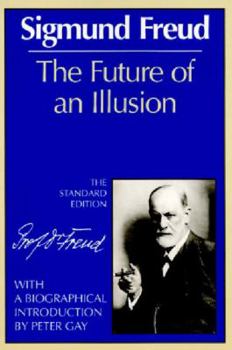Die Zukunft einer Illusion
Select Format
Select Condition 
Book Overview
Customer Reviews
Rated 2 starsMore like Sigmund FRAUD
Can you say unoriginal ideas?
0Report
Rated 5 starsRoger Schmeeckle Misrepresents Freud
In his 27 Feb 2006 review of Freud's The Future of an Illusion, Roger Schmeeckle misrepresents Freud's explanation (on pages 38-42 of this Norton publication) between Illusion and Delusion. Roger correctly identified Freud's concept of Delusion as "something that is believed that is not true" -- but then oversimplifies by stating that Freud said an Illusion is "something that may be true or false, but is believed because...
0Report
Rated 5 starsReligion Explained ... Again
This short book is well worth the plunge. It gives a psychoanalytic answer to the questions, Why God? and Why we still need a god? The book, written late in Freud's career, remains controversial mostly because of the nature of the subject matter. However, one should not be surprised that Freud's analysis ends as it does - suggesting that the world might be better off without religion. Many reviewers attribute this conclusion...
0Report
Rated 5 starsScientifc Analysis of Religion
.This is Freud's scientific analysis of religion. Religion, along with government and social, moral and ethical codes, or, civilization act as removing man from his true instinctal and destructive nature into a civil society. Religion is a neccessary illusion derived from men's wishes.Freud can be applauded and admired as a great thinker and psychoanalyst. This is an essential book to read. Yet Freud misses out on the mystical...
0Report
Rated 5 starsMommy, where did God come from?
In Freud's "The Future of an Illusion," he attempts to establish human motives for the creation of religion. If you hadn't guessed, Freud was a diehard atheist. He recognizes religion and an all-seeing, all-knowing man in the sky as an illusion to compensate for the mortality of our given father figures and as a divine system of reward and punishment for one's actions necessary for any society to function. Most people will...
0Report














